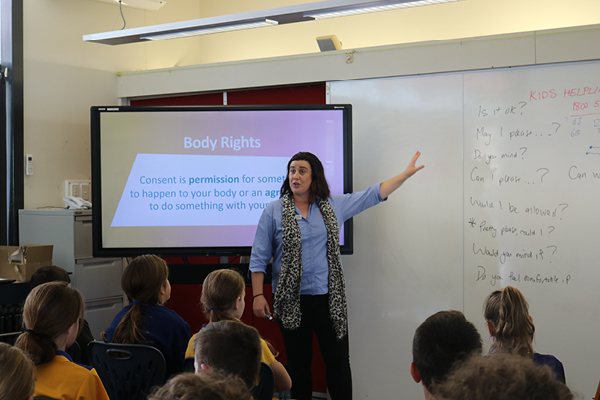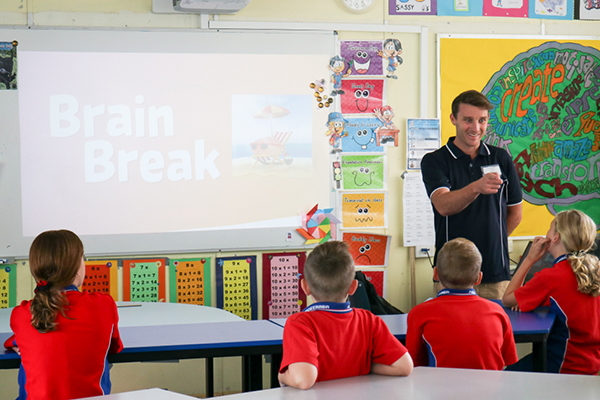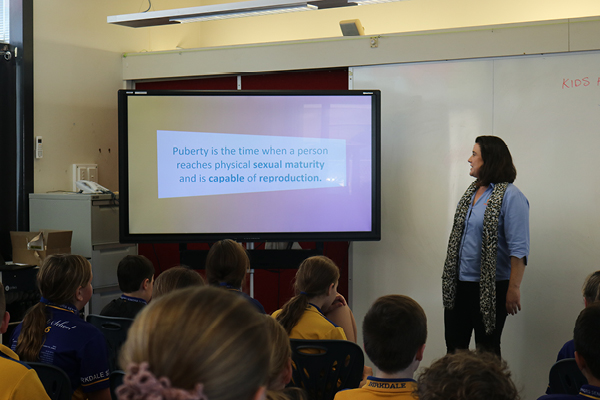Navigating puberty and the teenage years can be complicated and a little intimidating for young people, not to mention parents.
There are so many questions and unknowns. How tall will I be? When will I start getting a period? What physical changes should I discuss with friends and what should I keep to myself? How does reproduction happen? What is safe sex? And what does consent really mean?
Young people today are growing up in a different society to what their parents experienced. Information is available at the click of a keyboard, but not all of it is accurate, helpful or age appropriate. Now more than ever, young people need reliable resources, plus the social and emotional tools and right context to deal with complex contemporary issues.
In 2014, Life Ed Queensland developed the innovative Talk About It program to help children navigate puberty, sexual health and relationships. The program – now offered in Queensland, New South Wales and Victoria – includes a series of modules, delivered in the classroom by our team of specialist sexual health educators, with the regular classroom teacher present. The sessions provide a safe and welcoming space in which young people can learn about topics including identity, diversity and inclusivity, puberty changes, reproduction, protective behaviours and hygiene, consent, managing peer pressure, and building and maintaining healthy relationships.

Each term, parents, teachers and students share positive feedback about the Talk About It program – telling us young people not only found the sessions fascinating, fun and engaging, they now feel equipped with important knowledge and understanding about puberty, sexual health and relationships.
Gold Coast student Elias is one of those young people with fresh insight and the confidence to deal with puberty.
Since taking part in Talk About It sessions in both Years 5 and 6 with TAI educator Brad, he’s learned a great deal about how the human reproductive organs function and knows it’s important to be considerate of others who may be struggling with their puberty journey.
“I have learned that puberty is something that no one can escape, and I have learned that males’ bodies change a lot differently to females but there are a lot of things that are similar to both genders,” Elias said.
“Also, it is important that you respect everyone for who they are not what they look like because some people will be nervous, and some will get lots of pimples and others will gain hairs in uncomfy places,” he said.
Elias’s mother Sarah said the Talk About It program not only gave Elias a better understanding of the official changes experienced at puberty, it has also deepened his understanding of diversity.
“He has two older siblings who are autistic – one of whom identifies as gender queer and a sister who is still figuring it out – so he has a good understanding that different people are on different journeys and things like puberty and general development don’t look the same for everyone,” Sarah said.
Sarah says all three of her children have benefited from the Life Ed program at their school, with Elias’s Talk About It session still prompting perceptive discussion.

“So many aspects of the topic caught his attention and imagination, and every few weeks he will mention random things about physical development and how body structures change during puberty, and he will circle back to them and say to me: ‘Did you know that this happens?’”
“We have an’ open door’ and ‘open ear’ policy about discussing puberty, but I think for some kids there’s an embarrassment factor in wanting to talk to their parents about some of the stuff they’re going through.
“Having a qualified neutral third party who can share this information, who you can ask questions of and there being that little bit of a remove … that’s really helpful. Some kids may not have access to up-to-date information or things that may help them, or their background doesn’t support discussions like that, so I think it’s fantastic and incredibly valuable to have an organisation like Life Ed still coming to the school.”
For Taleah, a Year 6 student in Bundaberg, the TAI sessions prompted interesting conversations with mum Cheree.
“Taleah is now more open to talking to me about puberty and the changes that are happening in her body. She has been asking more questions about when I was her age and what happened to me. She asked me about my experience of giving birth to a child and she also wanted to know how she will feel when she has fallen in love with a person and how will she know if she is really in love?”
Meanwhile Hayden, a Year 6 student in Mackay learned that hormones play a crucial role in puberty and that everyone changes in their own way and in their own time.
“My sister is emotional because her brain is changing. One side of the brain develops faster. We need to be more respectful towards each other and more understanding of one another,” Hayden said.
And Gold Coast Year 6 student Milla liked learning about what to expect with puberty including the changes to the female and male body cycle.

Her mum shared this feedback:
“Milla learned about all the proper names of private parts and other various parts and organs in the female and male body. She learned the signs of puberty beginning such as pubic hair starting to grow in certain spots, muscle growth, growth spurts, growing pains, acne, deepening of the voice and pimples starting to appear in some spots.
“She also learned the things that can happen during puberty for both males and females. The most important thing that she learned was that puberty is completely normal for every single person and not to tease others about it!”
So far this year, our experienced team of Talk About It educators have delivered 568 sessions of the program in schools across Queensland with modules including: Welcome to Puberty, Surviving Puberty, Evolving Friendships and Navigating Relationships.
Find out more about Life Ed Queensland’s Talk About It program and how your school can book a session with one of our specialist educators.